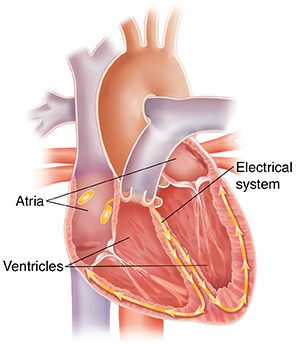Understanding Tachycardia
The heart has an electrical system that sends signals to control the heartbeat. Any abnormal change in the speed or pattern of the heartbeat is called an arrhythmia. If you have an arrhythmia that causes the heart to beat faster than normal, it is known as tachycardia. There are many types of tachycardia. They can affect the heart’s upper chambers (atria), the heart’s lower chambers (ventricles), or both.

What causes tachycardia?
Many things can cause tachycardia, including:
-
Damage to heart tissue from heart disease, past heart attack, or heart surgery.
-
Abnormal electrical pathways in the heart.
-
Problems with the heart’s structure that you are born with (congenital heart defect).
-
High blood pressure.
-
Overactive thyroid.
-
Use of certain medicines.
-
Severe blood loss or anemia.
-
Dehydration.
-
Severe stress, fear, or anxiety.
-
Smoking.
-
Too much alcohol or caffeine.
-
Abuse of certain street drugs, such as cocaine.
-
Infections.
-
Certain inflammatory conditions.
-
Pain.
What are the symptoms of tachycardia?
If you have tachycardia, you may notice a fast, pounding, or irregular heartbeat. Tachycardia can also make it harder for the heart to pump blood efficiently to the body. This may cause symptoms such as:
-
Shortness of breath.
-
Tiredness.
-
Dizziness or fainting.
-
Chest pain.
Some people with tachycardia may have no symptoms at all.
How is tachycardia treated?
Treatment for tachycardia depends on the cause. It also depends on the type you have and how severe your symptoms are. Tachycardia in the ventricles is often more serious than in the atria. For this reason, it may need to be treated right away. Possible treatments include:
-
Treating the underlying cause. For instance, if a medicine is causing your tachycardia, changing the dosage or stopping the medicine with your health care provider’s guidance may correct the problem.
-
Lifestyle changes. These include getting enough sleep and reducing stress. They also include avoiding caffeine, alcohol, tobacco, and illegal drugs.
-
Vagal maneuvers. These are techniques that may help interrupt a fast heartbeat and slow it down. One example is to take a deep breath and bear down hard while holding your breath.
-
Medicines. These may be used to help slow down a fast heartbeat. They may also be used to regulate the pattern of the heartbeat.
-
Electrical cardioversion. Special pads or paddles are used to send one or more brief electrical shocks to the heart. This treatment can help restore the heartbeat to normal.
-
Ablation. A long, thin tube called a catheter is inserted into a blood vessel and threaded to the heart. The catheter sends out hot or cold energy to the areas causing abnormal signals. This destroys tissue or cells where the abnormal electrical signal originates. This treatment may stop certain types of tachycardia.
-
Pacemaker. This device is placed just under the skin in the chest. It sends paced signals to make the heart beat at a predetermined rate and rhythm. While it can't slow your heart rate, some people may have both fast and slow heart rates. You may need a pacemaker if medicines used to treat tachycardia result in a heart rate that is too slow.
-
Implantable cardioverter defibrillator (ICD). This device is placed just under the skin in the chest or below the armpit. The ICD monitors your heart rate. When needed, it sends a controlled burst of signals to the heart to overdrive a tachycardia in the ventricles. It can also send a single stronger shock to the heart to stop a life-threatening type of tachycardia, if needed.
-
Surgery. During surgery, different techniques may be used to create scar tissue in the areas of the heart causing abnormal signals. This may help stop certain types of tachycardia.
What are possible complications of tachycardia?
These can include:
-
Blood clots or stroke.
-
Heart failure, which is when the heart muscle is so weak it no longer pumps blood well.
-
Fainting.
-
Sudden cardiac arrest, which is when the heart suddenly stops beating.
When to contact your doctor
Contact your health care provider right away if you have any of these: